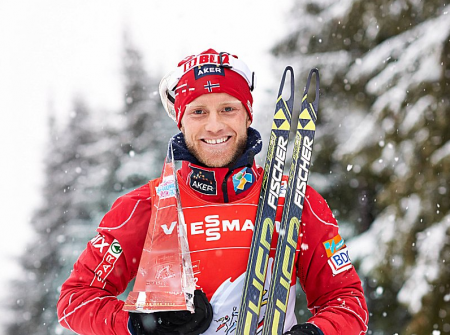
Martin Johnsrud Sundby led the final stage of the Tour de Ski and never looked back as he skied to his, and Norway’s, first victory in the event’s history. Sundby, who has skied in every Tour de Ski, called his feat a “dream come true” and, overcome, said, “I have a great feeling, deep into the soul.” Chris Jespersen of Norway, skiing in his first Tour de Ski, captured second place. Of his effort on the big climb, he said, “towards the end I thought, ‘Now I die.’”
Facing falling snow that grew heavier as the race progressed, Sundby began his day with a 49 second advantage over his teammate Petter Northug. Starting in third, Jespersen left 38 seconds after Northug. With Alex Harvey of Canada missing from the fourth position, Austria’s Johannes Dürr was the next in line to start, leaving the gates just over two minutes after Sundby.
The course looped once widely around the stadium before exiting for the approach to the base of the Alpe Cermis. An interval timing station at 1.8k showed that Sundby was skiing fast, exiting the stadium for the second time in 4:11. Northug, chasing, passed the marker in 5:01, having lost a second on Sundby already.
Leaving the stadium, the course followed a gradually descending trail for over three and half kilometers to the base of the climb. At the 4 k marker, midway between the stadium and the start of the climb, splits indicated that Sundby had increased his lead on Northug to 55 seconds. As Northug passed the timing check, he took off his glasses and threw them off the trail.
Jespersen was the next to cross the 4 k marker, 1:09 behind Sundby, gaining ground now on Northug who was only ahead of him by 14 seconds. Next through was Dürr, leading Sweden’s Calle Halfvarsson and Russia’s Ilia Chernousov, 2:11 behind Sundby.
As the trail began to steepen at the base of the Alpe Cermis, Jespersen caught Northug, and just before the time check at 6.2 k, Jespersen passed him. They were now 58 seconds behind Sundby.
Dürr led the second chasing pack through at 2:23, having lost 22 seconds to Sundby on the approach. Behind him were Chernousov, Halfvarsson, Alexander Legkov of Russia, and Sjur Røthe of Norway.
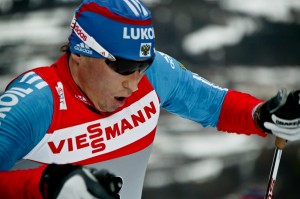
Less than a kilometer later, at 7.1 k, Sundby increased his lead to second place with Jespersen now 1:01 behind him and Northug trailing by a second.
Behind Northug by 1:13 came Dürr who was pulling Chernousov with him. A five second gap separated Chernousov from Legkov, whose heart rate had already reached 182 beats per minute, with 1.9 k of climbing left in the race. Røthe stuck with Legkov, but Halfvarsson, the tall Swedish sprinter, was beginning to fall off the pace, now five seconds behind Røthe.
After 7.1k, the course steepened. The challenging climb and subsequent curves were reminiscent of a giant slalom course being skied backwards. Sundby skied through this smoothly. Jespersen, too, seemed to still be skiing within his limits, but behind him Northug looked tired; his form looked haggard as he bore all his weight down on his poles. Jespersen was pulling away from Northug who could muster no response.
The 8.1 k split told the story clearly: Jespersen was now 21 seconds ahead of Northug who looked to be in no condition to catch back up. Jespersen had also pulled back a couple of seconds on Sundby, but with only 900 meters of race remaining, it looked like it would Sundby’s day.
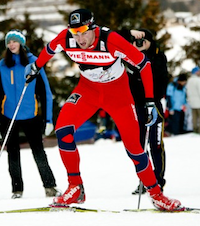 Northug found himself facing a new threat, however, in Dürr, who was now 36 seconds away from catching him, and he mut have known the Austrian was approaching. Dürr had now dropped Røthe by 21 seconds, and Chernousov, who had been skiing with Dürr a kilometer earlier had blown up. The Russian was now 43 seconds behind Dürr and had been passed by Røthe and Legkov.
Northug found himself facing a new threat, however, in Dürr, who was now 36 seconds away from catching him, and he mut have known the Austrian was approaching. Dürr had now dropped Røthe by 21 seconds, and Chernousov, who had been skiing with Dürr a kilometer earlier had blown up. The Russian was now 43 seconds behind Dürr and had been passed by Røthe and Legkov.
After the 8.1 k marker, the trail steepened again, this time to its most severe grade, a 28 percent slope. Sundby V1’d up the slope with an apparent ease that was belied by the tortured expression on his face. It was an impressive performance up a slope that has seen former Tour leaders like Dario Cologna of Switzerland reduced to single sticking up its formidable pitch.
Northug, on the other hand, didn’t look particularly graceful up the precipitous climb. Dürr who could see him, and his place on the podium, tantalizingly ahead skied after him hungrily, and on the top of the steep pitch, caught him.
At 8.5 k, 400 meters after the last timing interval, a grimacing Sundby led, comfortably ahead of second place Jespersen by 53 seconds. Dürr was 1:31 after Sundby, with Northug struggling to stay with him. Behind Northug by 36 seconds was Røthe, who had dropped the hard-charging Legkov on the last pitch by 28 seconds.
With 500 meters remaining, Sundby skied ahead, looking pained but not slowing in any apparent way. Jespersen, too, seemed steady in his skiing. The battle for third was also short-lived. Northug, skiing frantically behind Dürr as the course cut back and forth up the summit of Alpe Cermis, soon lost his form and appeared to have given up as Dürr skied away from him, less than half a kilometer from the finish line.
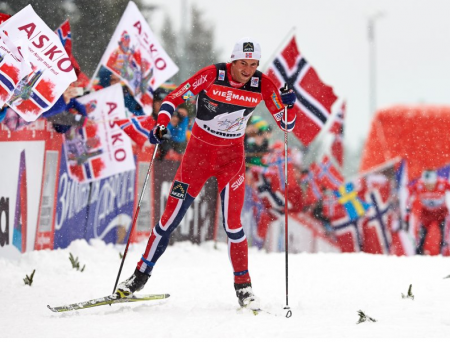
When Sundby reached the finish line, with his family watching from the sidelines, he did not slow down to celebrate or grab a Norwegian flag. Instead he powered through the finish, a long spindle of saliva hanging involuntarily from his mouth. He had no effort left for a celebratory arm raise, but could only muster the strength to push up his falling glasses.
Jespersen, approaching the finish line, turned over an amazing finishing tempo, jump skating through the finish to second place in the Tour de Ski, and with the second fastest climb of the day.
Dürr, too, came through the finish line as quickly as he could, setting the fastest time of the day and taking third place in the Tour de Ski. He raised his hands and yelled happily as he collapsed on the snow.
Northug, finishing fourth, was caught by Sundby after he crossed the finish line. Sundby looked to have some words of consolation for him.
Røthe was next across the line in 5th. He also recorded the third fastest time of the day. He was followed by Legkov, Norway’s Tord Asle Gjerdalen, Chernousov, Halfvarsson, and Didrik Toenseth of Norway.
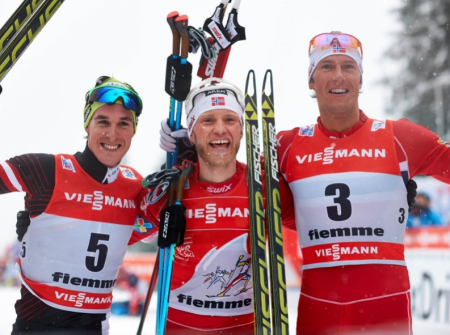
In all it was a very good day for Norway, with six men finishing in the top ten of the Tour de Ski, and narrowly missing out on a double podium sweep, with the Norwegian women taking the top three spots in their race.
Ivan Babikov of Canada, the last Canadian man in the Tour and a formidable climber, had another impressive day on the Alpe Cermis, having the fourth fastest day and skiing his way up from 21st to 16th, despite breaking a pole. In 2009 Babikov posted the fastest time up Alpe Cermis and was second in this same race last year.
“I have no idea why I’m good at this stage,” said Babikov following last year’s climb. “Where I grew up there were no hills. Everyone feels the pain at some point on the hill. Maybe I am able to cope with the pain a little better than others. People always ask me why I’m good at it and I don’t know. I just love climbing and I just go with it.”
Noah Hoffman of the US, also the lone American left in the Tour, skied his way from 31st to 25th overall. Hoffman said of his race, “I felt like I started hard, but the guys who started behind me caught me at the finish of the sprint loop. I struggled a little bit in the gradual downhill, the soft conditions are really challenging for me.” On the climb he went to work, moving from 30th to 25th. He stayed strong at the end, passing three skiers in the last kilometer.Hoffman is eager to return to the final climb in 2015, “I feel like I’m a better climber than I’ve shown on my two efforts on Alpe Cermis,” he said, “so I’m looking forward to another opportunity next year, and I really feel that I can have a top 5 or win the climb. I think climbing on skate skis is real strength of mine.”
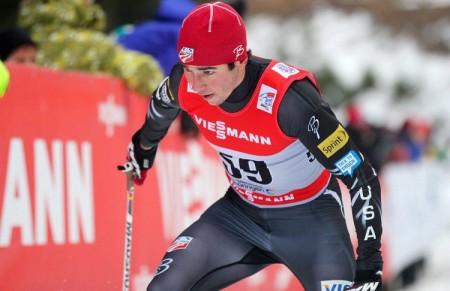
Sundby is a true veteran of the Tour de Ski, having skied in all eight editions of the race. His performance in this year’s Tour was worthy of a champion—he made it to the final of every sprint competition, and as a result skied the maximum distance possible in the Tour, and was a threat for the podium in all but one race.
He told FIS after the race, “This a dream come true for me. It has been a long way to here. This is my 8th Tour de Ski. It is an amazing moment for me. I did not have the best day today. I had to take it easy and go medium pace not to be totally tired soon. It was tough going first in the snow; it was quite slow. Olympics is the main goal for the season. It will be interesting now to see how my body responds after the Tour de Ski.”
For Sundby, his victory is a crowning achievement in a ski career that has developed slowly and steadily over the years. Norwegian newspaper Dagbladet called for Sundby’s name to be added to the pantheon of Norwegian sporting heroes for his achievement as a complete skier. “I have a great feeling, deep into the soul.” said Sundby to NRK after the race, “There is an awful lot of hard work behind this victory. There are a lot of emotions inside now.” An emotional Sundby told the Norwegian broadcaster, “Don’t ask many questions, I’ll start to cry.”
Sundby’s success has been the result of many small adjustments: more rest, less weight training, changing the way he records his training log, and refining his technique over the summer at Holmenkollen. Last but not least he has improved his diet, telling Dagbladet that, “It took a long time, but now I have discovered that Coke and potato chips are not the right thing to eat after exercise…It is very good, but it does not provide any energy in the long term.”
Sundby was initially annoyed with the change of the Tour format due to the poor snow available in Oberhof, Germany. He voiced his grievances to Dagbladet before the start of the prologue, calling it a “parody of cross country skiing” and grumbling about a lack of a venue change and the Tour being solely designed for television. After the prologue however, it occurred to Sunday that the training he had done made the new Tour format optimal for his abilities and he set about doing what he could to win it.
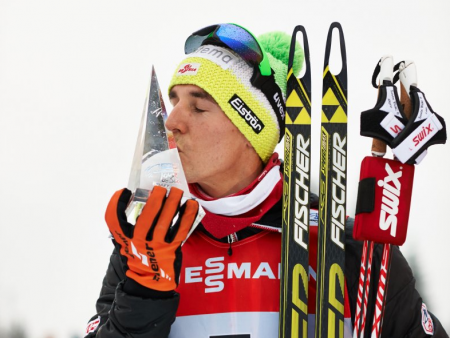
Jespersen for his part was an unknown factor heading into the Tour, his first ever. When asked by Dagbladet if he ever thought before the start of the event that he would finish second, he replied, “I really thought I was going to win, so…I ‘d at least hope so. But the tour was settled with the long race [Friday’s 35 k pursuit] with Martin in front. He is a worthy winner.”
His remarks to the Norwegian press didn’t quite match his comments to FIS, saying, “I had a great race today. I am very satisfied with second place. I tried to open very hard, when I passed Petter I tried to keep the pace high. I hope the shape will continue and I can perform well in Sochi. This season I had planned to do long distance competition so I am little bit surprised about the result.” To Dagbladet he said of the race, “It was great fun to go today. I was fit and had good skiing. But towards the end I thought, ‘Now I die.’ Luckily I got more power as I approached the top.”
Dürr confessed his excitement at taking third in the Tour. “It is awesome to be on the podium of the Tour de Ski,” he told FIS. “I can hardly realize it; it came too fast. After yesterday I had some hope for a podium. I knew I would need a perfect day and skis. I had great equipment today—not only today but during the whole Tour. I just gave it all and went totally full speed on the uphill.”
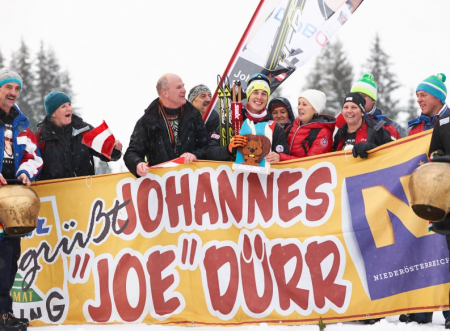
To the Austrian newspaper Der Standard, Dürr said, “I have only looked forward. As Northug briefly focused on me, I started to doubt it. But then [once across the finish line] everything that is in me, is brought out,” said a happy Dürr.
Northug, despite losing two places to finish outside the podium, did not express bitterness about his race. “I thought it would be uglier,” he told NRK. “I did not lose too much, and I got help from Chris [Jespersen]. Had I been alone, I’d have lost a minute.” He added further, “I got help from Chris and Dürr. When I went into the ground, I thought there were many that would pass me…I thought Legkov and several others were coming behind me and would walk past.” Northug said he was pleased to have finished at all in the top ten.
The 27 year old conceded to NRK that his goal of winning the Tour de Ski, one of his great dreams, is fading, saying, “I should have been four minutes into the ground” and, “I think I’m too fat to win the Tour de Ski.”
Pasha Kahn
Pasha Kahn writes and coaches in Duluth, Minnesota.
